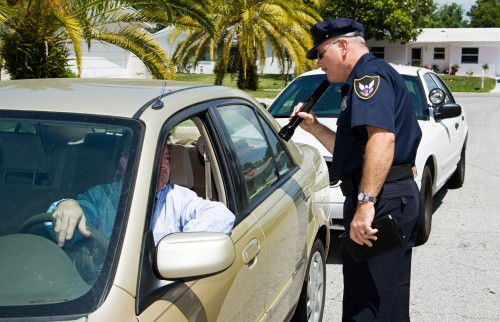It can happen at any time-a police car appears in your rearview mirror, red lights flashing. What now?
The first order of business is to pull over to the side of the road as soon as it is safe to do so. The police officer will pull in behind your vehicle and park.
Although there is no specific etiquette for police stops, generally you should remain in your car and wait for the officer to approach. You will be asked to show your driver’s license, and possibly your vehicle registration and proof of insurance, so while you’re waiting, you might take these items out of your wallet. Avoid making sudden movements and try to keep your hands in plain sight.
The officer may question you about your identity if the picture or physical description on your license doesn’t seem to match you.
If an officer starts to write a ticket, there is usually nothing you can do to stop it. Sometimes, however, you may be able to point out helpful circumstances beforehand: “But officer, that ‘No Left Turn’ sign is facing the wrong way.”
What if the officer wants to search your car?
If you don’t object to the intrusion and are certain you have absolutely nothing to hide, you can always give the officer permission to search. If you don’t want the search to proceed, however, you should state clearly and politely that you do not consent.
The law governing which area of your car the police may search in which circumstances is constantly changing. Moreover, state laws sometimes offer motorists greater protections against traffic stops and searches than federal laws do. If you have a question about a search the police have conducted of your vehicle, it is best to consult a lawyer in your state.
Generally, however, it is safe to say that if the officer has lawfully stopped your vehicle and has probable cause to arrest you, he or she has the right to search you, the passenger compartment and any containers in the passenger compartment. And if the officer has probable cause to believe that evidence of a crime like drugs is present in your vehicle, he or she can search anywhere that evidence might be located, including the trunk, without a search warrant.
And the officer may be allowed to “stop and frisk” you even if you are not under arrest if the officer has a reasonable suspicion that you are involved in an illegal activity or are carrying a concealed weapon.
What if you’ve had a few drinks?
Driving under the influence is a serious offense that under some circumstances can be charged as a felony with a possible prison sentence.
A police officer will stop you anytime he or she has reason to believe you are driving under the influence of drugs or alcohol. Among the driving behaviors that will cause an officer to become suspicious: driving erratically by repeatedly slowing down and then putting on a burst of speed; weaving from lane to lane; driving too slow; straddling the center lane; driving in the wrong lane.
If after approaching your car the officer smells an odor of alcohol, the officer will ask you to get out of your car and to stand beside it. After you obey the officer and get out of your car, you probably will be asked to perform a series of “field tests” or to take a “preliminary breath test.”
Different police departments employ different field tests. You may be asked to touch your index finger to your nose while closing your eyes and holding your head back, or to stand for 30 seconds on one foot, or to walk an imaginary straight line, or to allow the officer to shine a flashlight into your eyes to evaluate the reaction of your pupils.
Depending on the results of the field or preliminary breath tests, you may be asked to give a blood sample, give a urine sample, or take a Breathalyzer test. Can you refuse to perform the tests? Yes. But should you? There is no categorical answer to this question.
On the one hand, unless you are positive you’ve only had one or two alcoholic beverages, common wisdom holds that it may be harder to convict a driver if no tests were taken. On the other hand, if you refuse to take a test, your driving license will probably be suspended automatically for a long period of time. In some states, your refusal can be used against you in court.
Clearly you are in serious trouble either way-and in serious need of a lawyer.



コメント